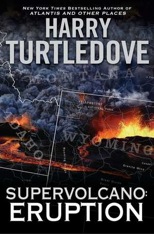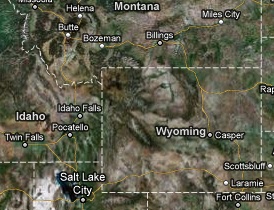 Yellowstone’s “supervolcano.” Harry Turtledove.
Yellowstone’s “supervolcano.” Harry Turtledove.
Score!
It seemed like a no-brainer to me when I saw Supervolcano: Eruption on the bookstore’s “new arrivals” table.
For being about the world’s greatest cataclysm, though, Turtledove’s new book was more “bore” than “score.”
I love Turtledove’s work, particularly his alternate histories. His fantastic research skills create plausible scenarios for those histories, and they’ve served him well, too, in some of his “straight-history” historical novels. I figured I’d get similar treatment in Supervolcano. As a geological novice, I thought everything Turtledove presented seemed plausible.
He also has a knack for thinking of things–repercussions of the eruption, in this case–that I’d never consider. Neither would most people, which is why casualties after a cataclysm would likely be so high. hat would all that grit in the air do to your car’s air filter, your windshield, your eyes, to your lungs? What would a destablized U.S. mean for the Middle East?
Turtledove also pays meticulous attention to characterization in everything he writes. He typically weaves together the stories of six or eight main characters (sometimes more), and in telling their individual stories in minute detail, he advances the larger plot, as well. A character sitting in an airport terminal might be able to give Turtledove the opportunity to posit about air traffic. Or perhaps the character catches something on CNN about weird weather patterns around the globe.
But Supervolcano’s characters are largely repulsive: a vain ex-wife, a bitchy daughter, a pot-smoking freeloading younger son, an emotionally distant older son…. Who’s to like in there, and why do I want to spend time reading about them?
Fortunately, the main protagonists, police lieutenant Colin Ferguson and his girlfriend, geologist Kelly Birnbaum, are likeable enough. Ferguson falls into a lot of police stereotypes, though, and Kelly doesn’t get enough face-time—odd, considering she’s a volcano expert and the book is about a giant volcanic eruption.
 The Yellowstone “supervolcano” is real enough, too. It sits under the earth’s crust in the northwest corner of Wyoming, where it butts up again Idaho and Montana, stretching for some 50 miles or so in diameter. (Look for the dark area near the enter of the map, right.) Its geothermal action is responsible for geysers like Old Faithful.
The Yellowstone “supervolcano” is real enough, too. It sits under the earth’s crust in the northwest corner of Wyoming, where it butts up again Idaho and Montana, stretching for some 50 miles or so in diameter. (Look for the dark area near the enter of the map, right.) Its geothermal action is responsible for geysers like Old Faithful.
Geological evidence suggests that the supervolcano erupts every 640,000 years or so—and apocalyptics like to point out, by that timeline, we’re due for an eruption any time now. Such a blast would be thousands of times stronger than the 1980 eruption of Mt. St. Helens and would even make eruptions like Krakatoa and Pompeii look dinky. Think potential extinction event, perhaps. Dinosaurs and meteors—that kind of “big.”
In Supervolcano, Yellowstone blows its lid about two-thirds of the way through the book, and it seems almost incidental.
Turtledove typically uses his large casts to sprinkle them in various key spots across the wide landscape of action so that he can tell the larger story from a lot of perspectives. Kelly has a close call when the eruptions blows, but otherwise, most characters are well away from the blast. There’s no one trapped in, say, Denver as the city gets buried under feet and feet of ash and grinds to a halt. The one character who lives there ducks out of town early. While her story ends up showing the life of people trapped in refugee camps, her previous perspective, trapped inside a dying city, would’ve been far more fascinating.
Other characters get sprinkled in L.A., Nebraska, and Maine, where winter gets really bad. Such perspectives allow Turtledove to explore some of the continental-wide effects of the blast, there’s little action.
And I’m not gonna lie: I wanted action. I wanted massive volcano carnage and mayhem. I wanted Dante’s Peak and Volcano rolled into one on the page. Instead, I got, “Oh, look at the TV! There’s been a big volcanic explosion. Hundreds of thousands of people have died. How terrible. My, isn’t the weather acting bit peculiar? Oh, and I was hoping I could talk to you about changing my major again.”
In Turtledove fashion, each character’s final episode leaves him/her in a place where there’s a bit of on-the-spot resolution but, in the context of the larger plot, he/she is well-positioned for a sequel. Turtledove could easily pick up right where he left off.
If he does, though, things better get a little Mad Max. I want Supervolcano II: Descent Into Hell. That’s why people read this stuff: action, suspense, and apocalypse. Characterization is all well and good, but people who read this kind of stuff want to see things blow up and burn down. I don’t know how much more mundane daily life I can take.
Categories: Arts/Literature, Environment/Nature, Science/Technology



Thanks for the review – I’ll know to skip this one! I would like to suggest “Ashfall” by Mike Mullin. It’s a YA title that was released this year – same premise. I think you’ll find it much more satisfying as far as action and that descent into hell feeling… it’s not for someone looking for a “feel good” read.
As James Atlas said of Henry James, Turtledove writes the kinds of books that once you put them down, you can’t pick them up again.
An interesting commentary from Chris Mackowski who wanted, as Chris points out, to read more action.As for the characters, Chris wondered what was the point in reading about them. Well, perhaps I should point out that the pot-loading, free-loading younger son shows some money-earning capacity in his creative writing class and it might be interesting to see what Turtledove does with that. The emotionally distant older son Marshall is in a band of four males about his own age and it will be interesting to see what happens there as Turtledove responds to the market and the times. Vanessa is a warning to us all, Chris, not to become too fond of being superior to other people. Her being trapped in ash-laden Denver might have been fascinating. She would have died, presumably, and her agonies in trying to survive might have been set forth in efficient prose but Vanessa, tho she is overconfident, is not without a sense of what is required for survival. The point of fiction is to set forth for readers what might happen so that readers might watch and relax and reflex and learn. Of course, there’s nothing to stop Chris from writing Supervolcano: Descent Into Hell and there is nothing to stop anyone from complaining that it is not a plea for animal liberation or told from the point of view of the volcano. Myself, I should perhaps add before closing that I am not the Australian writer.